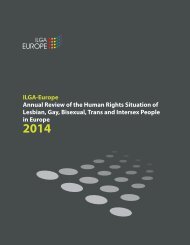Create successful ePaper yourself
Turn your PDF publications into a flip-book with our unique Google optimized e-Paper software.
kaj le bibolden ingerde. Kothe kamne te ingren<br />
vi amen. Zhutyardam kanak avel o po ronchi.<br />
(…)<br />
Chi po khandino than na mukhne avri amen,<br />
numa atunchi te kothe tordyonas. Pe avlina sas<br />
o khandino than, thaj nas slobodo andre te<br />
phandavas o vudar. Vi me andre gelom, andre<br />
kamlom te phandavav o vudar pe mande. Thaj<br />
marde man. Zhi kaj o vudar marde man, baro<br />
lazhavo sas mange, thaj chi muri butyi na<br />
zhanglom te kerav. Pala kodo aba sa jekh sas te<br />
kothe tordyonas, te na kerdam amari bari butyi.<br />
(…)<br />
Me kade zhanav tomna sas, kanak andre avile le<br />
rusura. Atunchi mukhle amen. Xutyilde jekh<br />
poronchi, vi o lilvalo manush kothe sas, thaj<br />
dikhlas amen, atunchi phendas, trubul te mukh -<br />
en le romen.<br />
(…)<br />
Kade gelom romeste, ke les andar e Vásáros -<br />
naményi ande, vi voj ando gettovo sas, kathe<br />
pinzhardam jekhekavres. Atunchi dikhlas man,<br />
thaj ke mande avilas. Deshupanzhe bershengi<br />
somas kana nashadom lesa. Muri sokra zurales<br />
lashi romnyi sas. Thaj sa muklas man o angluno<br />
rom, mukhlas man. Lestar jekh shavoro rakha -<br />
dyilas. Kathar o kaver panzh.<br />
(…)<br />
Sas kathe fabrika, thaj chi line amen opre.<br />
Gelamtar ande Pesta butyi te keras. Majsigo ge -<br />
lastar muro rom butyi te kerel, me kathe somas<br />
shove shavorenca. Pala kode pala leste gelom<br />
thaj kindam jekh cino kher ando Csepeli. Kothe<br />
sas amaro kher kaj le bulgarura beshnas,- kado<br />
vi tele iskirinde ando jekh ginadyi- avri shute<br />
vitték a zsidókat. Jobb lenne meghalnunk,<br />
mondták a cigány asszonyok, mert látták a gye -<br />
rekeknek a szenvedését. Azt vártuk mindig, mi -<br />
kor visznek bennünket, ahova vitték a zsi dókat.<br />
Oda akartak minket vinni. Vártuk mi kor jön a<br />
parancs.<br />
(…)<br />
Vécére se engedtek ki, csak ha ott álltak. Az ud -<br />
varon voltak a vécék, oszt nem szabad volt<br />
bezárni a vécéajtót. Én is bementem, be akartam<br />
zárni az ajtót magamra. Megvertek érte.<br />
Egész az ajtóig ütöttek, mert nem tudtam mit<br />
csinálni, szégyelltem. Hiába kellett, ott nézték<br />
az embert. De úgy megszoktuk már a végén,<br />
hogy muszáj volt. Ott álltak, míg valaki nagydolgozott!<br />
(…)<br />
Hát, én úgy tudom, ôsszel jöttek be az oroszok.<br />
És akkor elengedtek minket. Kaptak egy pa -<br />
rancsot, a fôjegyzô úr is itt volt kint, nézett bennünket,<br />
és akkor mondta, hogy el kell engedni a<br />
cigányságot.<br />
(…)<br />
Úgy mentem férjhez, hogy ôt Vásáros namény -<br />
ból hozták, ô is a gettóba volt, itt ismerkedtünk<br />
meg a gettóba. És akkor engemet megfigyelt, és<br />
eljött hozzám. Tizenöt éves voltam, mikor<br />
elszöktetett. Anyósom nagyon jó asszony volt.<br />
De csak elhagyott az elsô férjem, elhagyott. Tôle<br />
egy gyerekem született. A másodiktól öt.<br />
(…)<br />
Volt itt, ugye, gyár, de nem vettek fel bennünket.<br />
Elmentünk Pestre dolgozni. Elôbb elment a<br />
férjem dolgozni, én itt voltam hat gyerekkel. És<br />
utánamentem Pestre, vettünk egy kis szoba-<br />
been here at the station. It arrived in the<br />
autumn, but they could not deport us because<br />
of the Russians.<br />
Others were crying, they said it would have<br />
been better if the Germans had taken us after<br />
the Jews. Seeing the children’s suffering<br />
the Romani women said: ‘It would have been<br />
better, if we had died.’ We waited for them to<br />
take us to the place, where they had taken the<br />
Jews. They wanted to take us there. We were<br />
waiting for the order.<br />
(…)<br />
They did not let us go to the toilet alone. There<br />
were toilet in the courtyard and it was not<br />
allowed to close the doors. I went in and tried<br />
to close the door behind me. They beat me up<br />
for it. They were beating me until I reached the<br />
door, but I could not do it otherwise; I was<br />
ashamed. They watched you. But we had to go<br />
and by the and we got used to that. They were<br />
standing there while someone else did a poo!<br />
(…)<br />
So, I think the Russians arrived in the autumn.<br />
They set us free then. They had been ordered –<br />
the town-clerk was there, he looked at us, and<br />
told us – to let the Gypsies go.<br />
(…)<br />
I got married; he had been brought here from<br />
Vásárosnamény. He had been in the ghetto as<br />
well; we had met here in the ghetto. And then he<br />
noticed me and came for me. I was fifteen,<br />
when he eloped with me. My mother-in-law<br />
was a good woman. Even this did not stop him,<br />
from leaving. I had one child from him and five<br />
from my second.<br />
77



